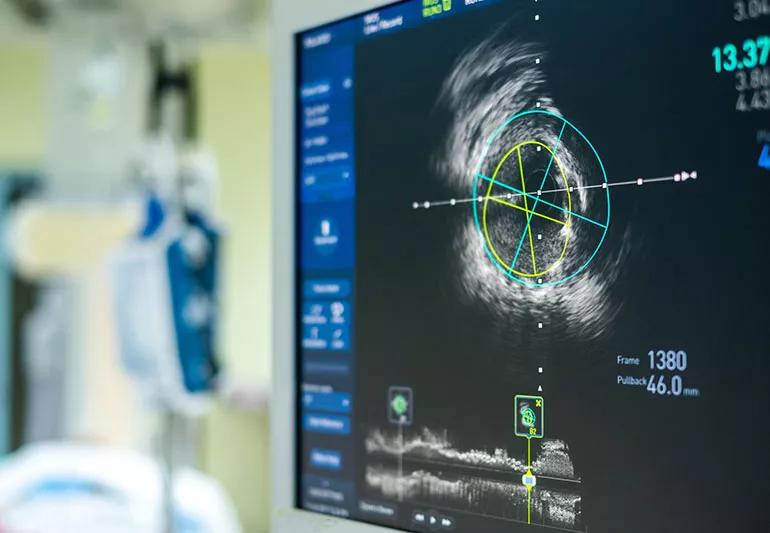Understand who may (and may not) benefit

Image content: This image is available to view online.
View image online (https://assets.clevelandclinic.org/transform/bbbd03dc-3aba-494e-be96-a755fc86b2a7/ultrasound-screen-1190647441_jpg)
Ultrasound imaging
If you’re concerned about your cardiovascular health (or that of a loved one), you might take notice if you get an email or flyer in the mail offering various ultrasound screening tests. Could they help avoid a heart attack or stroke?
Advertisement
Cleveland Clinic is a non-profit academic medical center. Advertising on our site helps support our mission. We do not endorse non-Cleveland Clinic products or services. Policy
Should you try it? Why not? Ultrasound is painless, the tests are quick and the price is reasonable.
However, there’s weak evidence such tests will be beneficial.
“Individual ultrasound screenings can be helpful in selected populations, but there are no data supporting their usefulness for people who have no symptoms and are considered at low-to-medium risk,” says preventive cardiologist Luke Laffin, MD.
Often these screening offers are from companies with portable scanners that will be parked at a nearby church or shopping center for a limited time. Sometimes it might come on your insurance company’s letterhead — but know that doesn’t mean the cost will be reimbursed.
The offer generally includes scans of your neck and leg arteries, as well as your abdominal aorta. The letter emphasizes that screening these vessels can reveal dangerous plaque buildup. It may say that most strokes come without advance warning, implying that the scan may reveal whether you are at risk for stroke.
And furthermore, the promotional material may stress that the screening tests you will undergo are the same ones your doctor would order — and would be reimbursed — if you had symptoms. This is true, and for good reason.
Advertisement
“If these tests were something everyone should have, we would recommend everyone have them,” Dr. Laffin says. “If these tests truly saved lives or prevented strokes and heart attacks, insurance would cover them.”
But the nuance is that since you don’t yet have symptoms and aren’t going directly through your doctor’s office, getting the screening on your own through a third party means you’ll be paying out-of-pocket.
Individual ultrasound screening tests may be helpful for certain people. For example, a one-time ultrasound of the abdominal aorta is recommended at age 65 to 75 for men who have smoked to look for an abdominal aortic aneurysm.
Similarly, screening the legs and ankles may be recommended for someone diagnosed with cardiovascular disease or at increased risk for it, particularly if they have leg cramps.
An ultrasound of the carotid arteries will be performed immediately in someone who reports symptoms of transient ischemic attack (TIA), a “mini-stroke” that resolves spontaneously. TIAs are warning signs that a full-blown stroke is imminent.
“It is important for anyone who receives this warning to go immediately to the emergency room for treatment to prevent a stroke from occurring,” says M. Shazam Hussain, MD, Director of Cleveland Clinic’s Cerebrovascular Center. “The highest risk for stroke is within two day after the TIA, so no one should wait to get checked.”
In all these cases, testing will be reimbursed.
There’s nothing wrong with signing up for these screenings, so long as you understand they may not reveal any useful information. In some cases, the findings may lead to more testing.
“If you are very concerned about your cardiovascular risk, these tests are reasonable, if you don’t mind paying $135 to $150 out of pocket,” says Dr. Laffin. “But what will you do with the results? Screenings are only a small part of determining risk.
“If you are very worried about your risk, tell your doctor. Together, you can determine your actual risk and make a plan of action to lower it,” he says.
An ischemic stroke is caused by plaque in your carotid arteries. You’re at increased risk if you have:
“Anyone with these risk factors should work closely with their doctor to determine which medications and lifestyle changes are needed to lower their risk,” says Dr. Laffin.
This article first appeared in Cleveland Clinic Heart Advisor.
Advertisement

Delivered every Tuesday!
Sign up for our Health Essentials emails for expert guidance on nutrition, fitness, sleep, skin care and more
It's a letter about the news!

Every two weeks once
Sign up for our Health Essentials emails for expert guidance on nutrition, fitness, sleep, skin care and more.
Learn more about our editorial process.
Advertisement
How to protect your little one from bacteria and viruses
Helping children, tweens and teens prepare for their turn at the COVID-19 vaccine
The list includes shots for 16 potentially harmful diseases
The best tools and practices from a pediatrician
Most recommended precautions center around minimizing bruising or swelling
Even one drink can have an impact on your cognitive function leading to slurred speech, blurred vision and impaired memory
Type 2 diabetes isn’t inevitable with these dietary changes
Applying a hot or cold compress can help with pain
Pump up your iron intake with foods like tuna, tofu and turkey